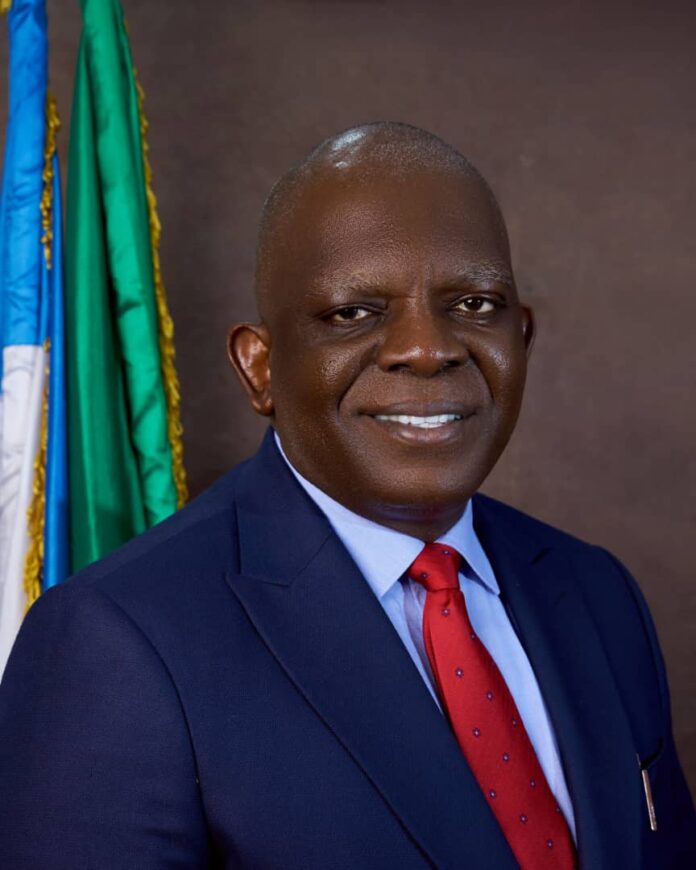Barr. Pius Akutah: Charting a new course with innovative leadership of Nigeria Shippers Council
By Razornewsng.com
His appointment was greeted with applause. And that speaks volumes about the need for that position to be filled by someone with the capacity to do the needful in the maritime sector. After years of wallowing in the doldrums, the Nigerian Shippers Council, NSC, needed an overhaul of its operating philosophy, systems and processes, and capacity direction of staff.
What’s more, the Council is the aorta of the Blue Economy, which itself is the nucleus of the ambitious plan of President Bola Ahmed Tinubu to transform Nigeria into a $1 trillion economy country.
Hence, the importance attached to appointing someone who could be trusted with the weighty responsibility of transforming NSC. The job called for a ‘square peg in a square hole.’
Against this backdrop, the collective sigh of relief that greeted his appointment as the Executive Secretary and CEO of NSC was an expression of public confidence in his forte and finesse to execute the needed turnaround. Therefore, Pius Ukeyima Akutah came into the job amid high expectations.
Indeed, Akutah was a high-profile appointee: a legal expert, versed in law, especially international criminal law; an advocate and solicitor of the Supreme Court of the Federal Republic of Nigeria, with a sturdy pedigree of being a principal State Counsel and head of the Central Authority Unit, International Cooperation in Criminal Matters, in the Office of the Attorney General of the Federation. For a long time, he had been a crucial cog in the system of the Federal Ministry of Justice.
With such an overwhelming profile, will he be able to untie the Gordian knots that had beleaguered the NSC and render it a lilliput of a maritime regulator, despite its huge transformative potential?
One can take a cue from the life of the man himself. Born in 1968 in Ushongo Local Government Council Area of Benue State, Akutah, the first of 18 children, spent his early life in Kaduna State with his father, a serving personnel of the Nigerian Army. He was, however, sent to Gboko and enrolled at the popular Comprehensive High School where he got distracted and played more football than focused on his studies. That affected his academic progression and brought about instances of dropping out of school and the derailment of his ambition of becoming an accountant. But fate brought him into the field of law, where he showed grit in earning his qualifications: Diploma in Law from the University of Jos (1995); LLB from the University of Abuja; and LLM from Ahmadu Bello University (2012).
Reflecting on the twists and turns of his education, he once said: “It doesn’t matter how many times you have gotten it wrong; you can get it right even at the 20th attempt.”
With this philosophy as the backbone of his career success, he subsequently embarked on building his reputation as a legal technocrat who, for 12 years, including as a Principal State Counsel, became known for versatility, resourcefulness and results. In that capacity, he handled critical functions relating to the negotiation of international agreements, formulation of Mutual Legal Assistance (MLA) and prosecution of extradition cases. These tasks require a deep understanding of the international legal framework and being well-versed in United Nations conventions, sub-regional charters and operations of public international institutions and multinational corporations within the realm of international politics.
That, in a nutshell, was the metier of the legal technocrat who took over as the helmsman of the Nigeria Shippers Council on November 1, 2023.
Since he resumed office, Pius Akutah has left no one in doubt about his intention to chart a new course for NSC. This much he conveyed in no uncertain words in his address to the staff of NSC where he emphasised the importance of everyone working in unity to realise the Council’s mandate within the context of the Marine and Blue Economy.
Without much ado, he hit the ground running and indeed matched his words with action.
As the Port Economic Regulator and a trade facilitation agency, it is NSC’s responsibility to promote fair trade practices in the industry amongst the providers and consumers of shipping and port services. It is also the council’s duty to establish an enabling environment for all stakeholders by instituting an efficient and effective economic regulatory system in the transport sector. Given its backstory of mediocrity, chaos and inefficiency, Akutah had a tall order before him.
But ten months down the line, the man has acquitted himself creditably. The results he has recorded are significant milestones in the annals of the 46-year-old institution.
His series of initiatives leverage innovation and strategic collaboration to cause a parading shift and bring about a new order where transparency and efficiency are ingrained in the operations of the Council.
Thus far, his silent reforms have had a transformative and far-reaching impact on the maritime landscape.
For a start, he had pursued the digitalisation of NSC activities, which he wasted no time in achieving.
“The Council advocates automation of port operations and processes and I can confidently confirm that over 90 per cent of our port operations and processes are automated by now. This is consistent with the mandate of the Nigerian Shippers Council of ensuring port efficiency, safety and security of cargoes, cost reduction and ease of doing business,” he announced barely seven months after he resumed duty.
Secondly, he has deployed his legal and negotiating skills to foster strategic partnerships and collaborations within the Ministry of Marine and Blue Economy and among other industry stakeholders to secure the passage of the Shipping and Ports Economic Regulatory Bill in the House of Representatives. Having broken that jinx, it is only a matter of time before the process is concluded in the Senate. The passage of the bill will give the council the statutory sinew to play its regulatory functions to the hilt.
He similarly facilitated an MoU between NSC and the Nigerian Railway Corporation, a landmark feat that will facilitate seamless evacuation of cargo by rail from the ports to inland dry ports.
Within a short period, he has also ramped up efforts to implement the International Cargo Tracking Note (ICTN), set to be mainstreamed in the third quarter of 2024. This innovative step will curb corruption at the ports, instill more transparency in the clearance of goods and block leakages in revenue generation.
In the same vein, the NSC under his leadership is also aggressively pursuing the Single Window Project, a port community system targeted at ensuring Ease of Doing Business (EoDB) at the seaports.
Other projects in the works include having at least one inland dry port in each of the six geopolitical zones.
In the meantime, he had played crucial role in the development of the National Transport Master Plan, and the establishment of the Maritime Academy of Nigeria, dedicated to nurturing future maritime professionals.
These are remarkable because they were achieved in his first 300 days in office.
The gravity of his reforms at NSC and the wider maritime industry was summed up recently by the Secretary to the Government of the Federation, Senator George Akume, who avowed that the NSC CEO “carries his responsibilities with brilliance, excellence, humility and the zeal to serve.”
In the words of Akume: “If we look from where he took off to where he has come, we will recall the milestones he has reached, and every one of them is laudable. It is good that in the midst of greatness, in the midst of mighty men, he is a shining star.”
Similarly, the Minister of Marine and Blue Economy, Adegboyega Oyetola, hailed the Akutah Effect, saying: “Although it is less than a year since he assumed office as Executive Secretary and CEO of the Nigerian Shippers Council, the council under his watch is making impressive and steady progress that is highly commendable.”
It is instructive to be reminded that Akutah has barely spent 10 months in the saddle.
But his vision is clear and manifest, as he had modestly declared that “the major thing that I want to do going forward is the restructuring of the Shippers’ Council.”
All he has done thus far is but a prelude to the great achievements ahead.
According to him: “Now we have a mandate to be the port economic regulator. Once I have that law passed, the Council will truly become an agency that is raising revenue for the government, when we implement the ICTN, at the end of the year.”
From the beginning, he has a vision of the end, which he stated this way: “I want to be able to raise the profile of the Nigerian Shippers’ Council so that at the time I’m leaving; it will be contributing meaningfully to Nigerian national GDP. That’s one of the major achievements I want to attain.”
Akutah’s reforms at NSC have put Nigeria on a trajectory to becoming a regional maritime hub that is globally competitive. All things considered, it’s not too early to give him a standing ovation―and it is in order to acknowledge his trailblazing effort and his inspiring leadership.
[All Rights Reserved for Razornewsng.com]




